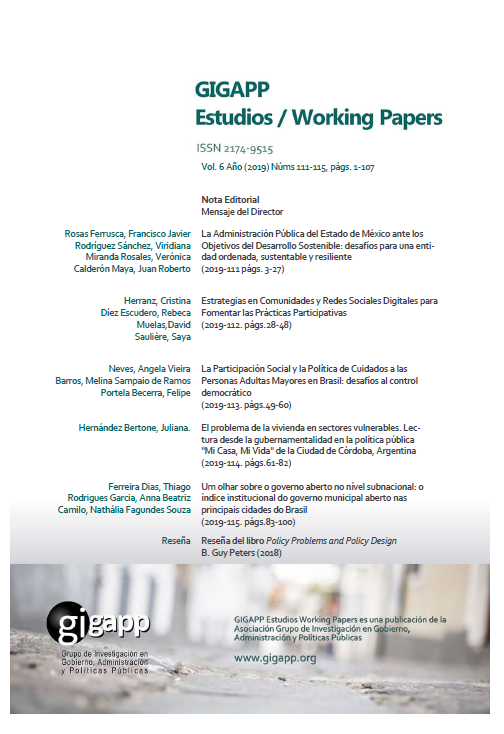Digital Social Networks strategies to Promote Participatory Practices
Abstract
(Winner paper: Junior Researchers Award "Joan Prats" 2018)
Online participation platforms are key tools to include citizens in government activities and public policy co-creation processes. However, its effectiveness may decrease if citizens do not use them effectively. This paper analyzes the possibilities offered by open data and social networks to encourage engagement to improve participatory practices. To do this, it follows a design based on mixed methods that explores participation of an online platform at local level, and a case that applies combined strategies on communities and social networks. Preliminary results show that the efforts in these media can be fragmented, although there seem to be latent communities that, if organized, are capable of co-creating proposals with greater impact.
Downloads
Copyright (c) 2019 Cristina Herranz, Rebeca Díez Escudero, David Muelas, Saya Saulière

This work is licensed under a Creative Commons Attribution-NonCommercial-ShareAlike 4.0 International License.
Those authors who have publications with this journal, accept the following terms:
a. Authors will retain their copyrights and guarantee the journal the right of first publication of their work, which will be simultaneously subject to the Creative Commons Attribution-NonCommercial-ShareAlike 4.0 International (CC BY-NC-SA Recognition License). 4.0) that allows third parties to share the work as long as its author and its first publication are indicated in this journal.
Under this open access license, readers (users) can:
- Share — copy and redistribute the material in any medium or format
- Adapt — remix, transform, and build upon the material
Under the following terms:
-
Attribution — Users must give appropriate credit, provide a link to the license, and indicate if changes were made. You may do so in any reasonable manner, but not in any way that suggests the licensor endorses you or your use.
-
NonCommercial — Users may not use the material for commercial purposes.
-
ShareAlike — If remix, transform, or build upon the material, users must distribute your contributions under the same license as the original.
- No additional restrictions — Users may not apply legal terms or technological measures that legally restrict others from doing anything the license permits.
b. Authors may adopt other non-exclusive license agreements for the distribution of the version of the published work (eg: deposit it in an institutional telematic archive or publish it in a monographic volume) provided that the initial publication in this journal is indicated.
c. Authors are allowed and recommended to disseminate their work through the Internet (e.g. in institutional telematic files or on their website) before and during the submission process, which can lead to interesting exchanges and increase citations of the published work. (See The effects of open access).



